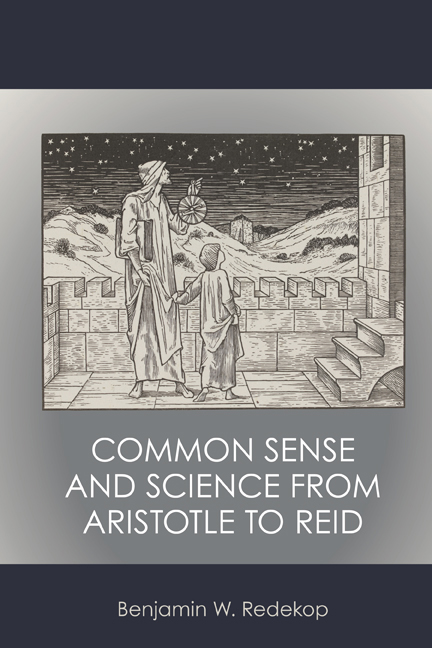Book contents
- Frontmatter
- Contents
- Acknowledgments
- Introduction
- 1 Common Sense and Scientific Thinking before Copernicus
- 2 The Challenge of Modern Science and Philosophy
- 3 Common Notions, Sens Commun: Herbert of Cherbury and Renè Descartes
- 4 Hobbes, Locke, and Innatist Responses to Skepticism and Materialism
- 5 Common Sense in Early Eighteenth-Century Thought
- 6 Common Sense and Moral Sense: Buffier, Hutcheson, and Butler
- 7 Common Sense and the Science of Man in Enlightenment Scotland: Turnbull and Kames
- 8 Common Sense, Science, and the Public Sphere: The Philosophy of Thomas Reid
- Epilogue
- Notes
- Index
- Frontmatter
- Contents
- Acknowledgments
- Introduction
- 1 Common Sense and Scientific Thinking before Copernicus
- 2 The Challenge of Modern Science and Philosophy
- 3 Common Notions, Sens Commun: Herbert of Cherbury and Renè Descartes
- 4 Hobbes, Locke, and Innatist Responses to Skepticism and Materialism
- 5 Common Sense in Early Eighteenth-Century Thought
- 6 Common Sense and Moral Sense: Buffier, Hutcheson, and Butler
- 7 Common Sense and the Science of Man in Enlightenment Scotland: Turnbull and Kames
- 8 Common Sense, Science, and the Public Sphere: The Philosophy of Thomas Reid
- Epilogue
- Notes
- Index
Summary
Thomas Reid's philosophy of common sense exercised a significant influence on Western thought and continues to be relevant today. It appeared on the world stage as a scientific philosophy amenable to Christian beliefs, the rise of a modern public sphere and democratic politics. Exercising its most profound impact in postrevolutionary France and America, it promised to combine progress and stability, establishing links between common-sense experience and philosophical and scientific thought in an era of rapid sociopolitical, religious, and scientific change. It had a significant impact on the development of higher education in both countries and was an important undercurrent in the broad expanse of nineteenth-century intellectual culture, a current which fed and mingled with other streams of thought.
Although an identifiable school of “common-sense philosophy” began to wane around the middle of the nineteenth century, Reid's philosophy proved to be a multivalent and fertile influence on subsequent philosophical developments in Britain, France, and America. Reid's impact in Germanspeaking lands was slight but worth considering. And today his thinking remains pertinent not only to philosophers but also to psychologists, cognitive scientists, and philosophers of science. In what follows, I first provide an analytical overview of Reid's historical influence and impact in Britain, France, Germany, and America, before concluding with some observations on the relevance of his thought to the findings of contemporary research into the nature and structure of the human mind and to the ongoing scholarly discussion about the relationship between common sense and scientific inquiry.
Reid's thought gained an immediate following upon publication of his Inquiry in 1764. James Oswald (1703–1793) was a Scottish minister who published An Appeal to Common Sense in Behalf of Religion in two volumes (1766/ 1772). Although he cited Reid sparingly, Oswald seized upon Reid's ideas to defend the faith from “the assertions of sceptics and infidels,”1 opposing the common-sense principles that ordinary people take for granted to the labored and drawn-out reasonings of the learned, the latter threatening to confound the instinctive moral and religious impulses possessed by all human beings.
- Type
- Chapter
- Information
- Common Sense and Science from Aristotle to Reid , pp. 135 - 164Publisher: Anthem PressPrint publication year: 2020



